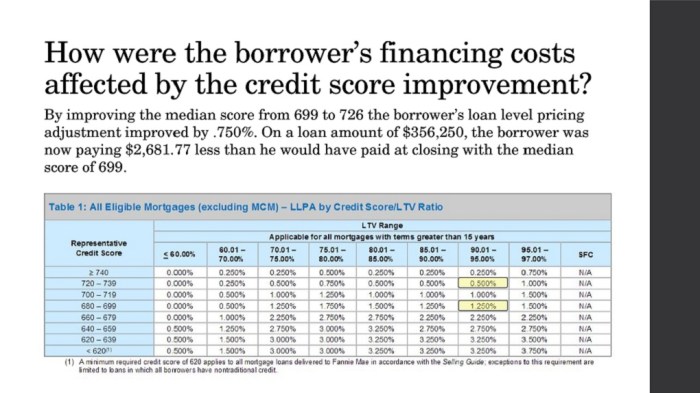Understanding the ngpf impact of credit score on loans is crucial for anyone seeking financial stability. A credit score, a numerical representation of an individual’s creditworthiness, plays a significant role in determining the terms and conditions of loans, including interest rates and approval chances.
This guide delves into the intricate relationship between credit scores and loans, exploring the factors that influence credit scores, strategies for improving them, and the consequences of different credit scores on loan outcomes.
Impact of Credit Score on Loan Terms

A credit score is a numerical representation of an individual’s creditworthiness, based on their credit history and financial behavior. It plays a crucial role in determining the terms and conditions of loans, including interest rates, loan amounts, and approval status.
The relationship between credit score and loan interest rates is direct: higher credit scores typically result in lower interest rates. This is because lenders perceive borrowers with higher credit scores as lower-risk, making them more likely to repay their loans on time and in full.
Conversely, borrowers with lower credit scores are considered higher-risk and may be charged higher interest rates to compensate for the increased risk.
The impact of credit score on loan terms can be significant. For example, a borrower with a credit score of 750 may qualify for a mortgage interest rate of 3%, while a borrower with a credit score of 650 may qualify for a rate of 4%. This difference in interest rates can result in substantial savings over the life of the loan.
In addition to interest rates, credit score can also affect loan approval. Lenders typically have minimum credit score requirements for different types of loans. Borrowers who do not meet these requirements may be denied a loan or may only be approved for a smaller loan amount or at a higher interest rate.
Factors that Influence Credit Score

A credit score is calculated using a complex algorithm that considers various factors, including:
- Payment history:This is the most important factor, accounting for about 35% of a credit score. It measures how consistently and on time you have made payments on your credit accounts.
- Credit utilization:This measures how much of your available credit you are using. A high credit utilization ratio (above 30%) can lower your credit score.
- Credit mix:This refers to the variety of credit accounts you have. Having a mix of different types of credit, such as credit cards, installment loans, and mortgages, can improve your credit score.
- Credit inquiries:Hard inquiries, which occur when you apply for new credit, can temporarily lower your credit score. Multiple hard inquiries in a short period of time can be a red flag for lenders.
- Length of credit history:The longer your credit history, the better your credit score. This is because lenders can see that you have a track record of responsible credit use.
Strategies for Improving Credit Score: Ngpf Impact Of Credit Score On Loans

Improving your credit score takes time and effort, but it is possible. Here are some strategies to help you:
- Make all payments on time:This is the most important step you can take to improve your credit score.
- Reduce your credit utilization:Pay down your credit card balances and avoid using more than 30% of your available credit.
- Build a positive credit history:Open new credit accounts and use them responsibly. Make sure to make all payments on time and keep your credit utilization low.
- Dispute errors:If you find any errors on your credit report, dispute them with the credit bureau. Correcting errors can improve your credit score.
- Monitor your credit:Get a free copy of your credit report from each of the three major credit bureaus (Equifax, Experian, and TransUnion) once per year. Review your reports carefully and look for any errors or suspicious activity.
FAQ Compilation
What is the significance of credit score in loan applications?
A credit score is a crucial factor that lenders consider when evaluating loan applications. It serves as an indicator of an individual’s creditworthiness and ability to repay debt, influencing both loan approval and the terms offered.
How does a low credit score affect loan terms?
Individuals with low credit scores may face higher interest rates, shorter loan terms, and stricter repayment conditions. They may also encounter difficulties in obtaining loan approval.
What are the key factors that influence credit scores?
Credit scores are primarily influenced by factors such as payment history, credit utilization, credit mix, and the length of credit history. Maintaining a consistent track record of timely payments, keeping credit utilization low, and diversifying credit accounts can contribute to a higher credit score.

